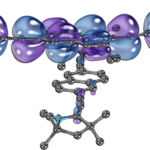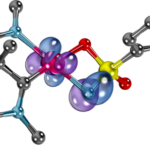HPC User Report from D. Munz (Chair of Inorganic and General Chemistry)
Electronic Structure Elucidation for Catalysis and Electronic Organic Materials
We use computational chemistry to guide our synthetic-experimental efforts. In particular, we predict novel approaches towards catalysis and the rational design of functional organic materials.
Motivation and problem definition
The isolation of multiple bonded late transition metal complexes is a challenging task. Nevertheless, they are alleged key intermediates for important “every day” catalysis processes such as the oxidation of ammonia to nitric acid by O2 (Ostwald process) or the catalytic depletion of toxic exhaust gases. Our calculations predict how to tame these elusive molecules to study them in the laboratory. Similarly, we use computational methods to study organic redox systems and diradicaloids. We have predicted how to harness the peculiar properties of these compounds in solar cells.
Methods and codes
- Methods: DFT, NEVPT2/CASSCF, CCSD(T)
- Codes: ORCA, Gaussian, Turbomole, (OpenMolCAS; not at RRZE)
Results
Our computational predictions have predicted innovative synthetic approaches. These have been in the meantime realized in the laboratory and/or synthetic work is ongoing.
Outreach
- Messelberger, J.; Grünwald, A.; Pinter, P.; Hansmann, M. M.; Munz, D.: Carbene derived diradicaloids – building blocks for singlet fission? Chem. Sci. 2018, 9, 6107.
- Munz, D.: Pushing Electrons-Which Carbene Ligand for Which Application? Organometallics 2018, 37, 275.
- Munz, D.: How to tame a palladium terminal oxo. Chem. Sci. 2018, 9, 1155.
- Grünwald, A.; Munz, D.: How to tame a palladium terminal imido. J. Organomet. Chem. 2018, 864, 26.
- Grünwald, A.; Orth, N.; Scheurer, A.; Heinemann, F. W.; Pöthig, A.; Munz, D.: An Isolable Terminal Imido Complex of Palladium and Catalytic Implications. Angew. Chem. Int. Ed. 2018, 57, 16228.
- Malischewski, M.; Seppelt, K.; Sutter, J.; Munz, D.; Meyer, K.: A Ferrocene-Based Dicationic Fe(IV) Carbonyl Complex. Angew. Chem. Int. Ed. 2018, 57, 14597.
- Hansmann, M. M.; Melaimi, M.; Munz, D.; Bertrand, G.: Modular Approach to Kekule Diradicaloids Derived from Cyclic (Alkyl)(amino)carbenes. J. Am. Chem. Soc. 2018, 140, 2546.
Researcher’s Bio and Affiliation
Dominik Munz obtained studied chemistry and chemical engineering at TU Dresden and ENSC Lille. He obtained his doctoral degree in physical organic chemistry from TU Dresden. After postdoctoral stints in catalysis with T. B. Gunnoe at the University of Virginia and inorganic chemistry with G. Bertrand at UC San Diego, he joined FAU Erlangen. Currently, he performs habilitation work as a Liebig fellow at the chair for inorganic and general chemistry (K. Meyer). Additional support by the Boehringer-Ingelheim foundation, Fulbright-Germany, and the DECHEMA (Max-Buchner fellowship) is gratefully acknowledged.
